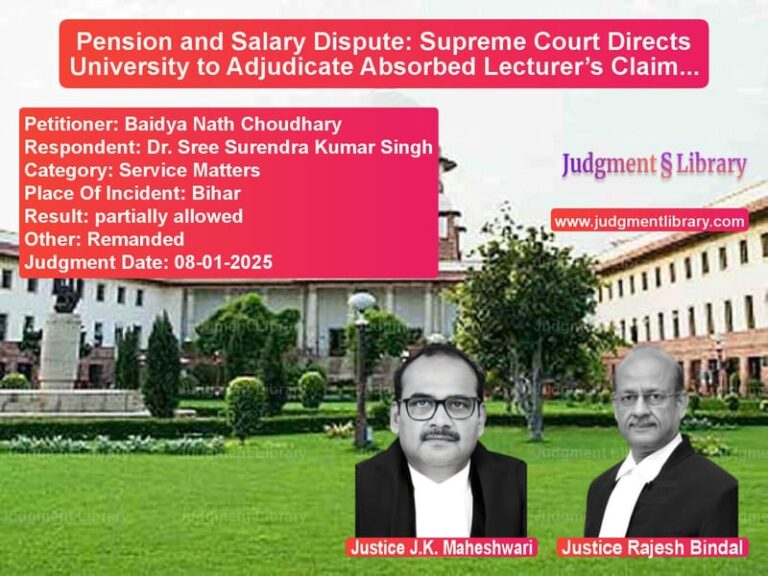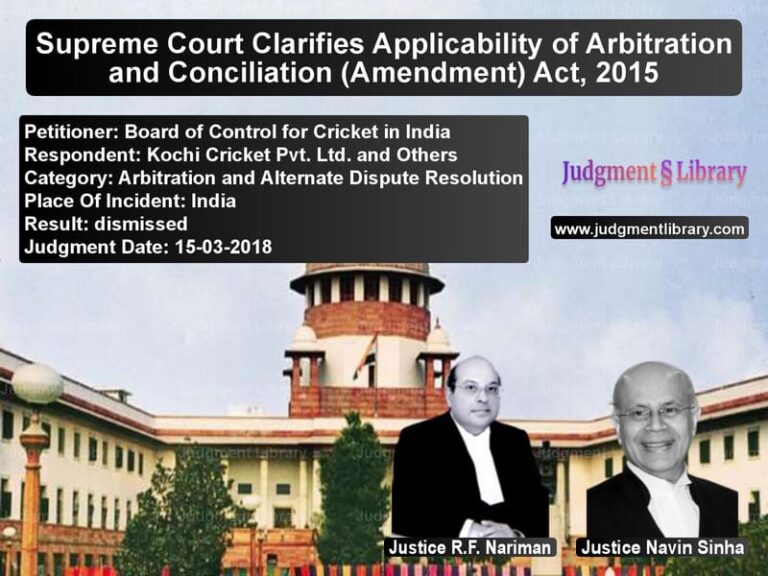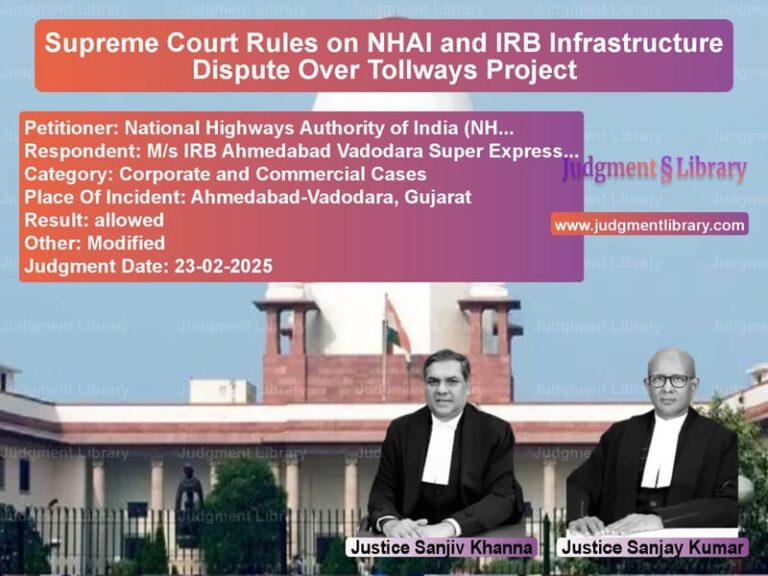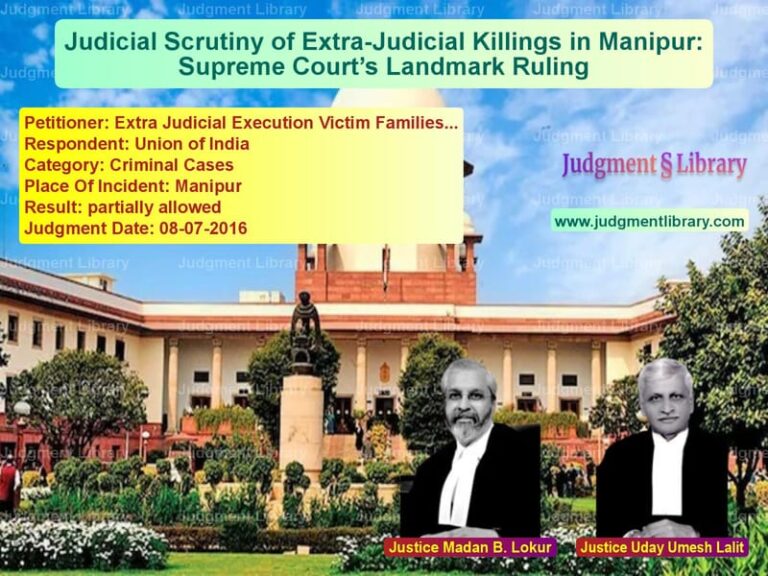Eviction and Landlord-Tenant Disputes: Supreme Court Rules on Kerala Rent Control Act
The case of Thankamony Amma & Ors. vs. Omana Amma N. & Ors. revolves around a long-standing landlord-tenant dispute concerning the possession of a commercial property in Kerala. The Supreme Court’s ruling clarifies key aspects of the Kerala Buildings (Lease and Rent Control) Act, 1965, particularly the scope of revisional jurisdiction and the requirement of proving a landlord-tenant relationship in eviction proceedings.
The main legal issue in this case was whether the respondents, who were in possession of the disputed property, had a valid tenancy agreement with the appellants or were merely managing the business without any tenancy rights.
Background of the Case
The dispute concerns a piece of land measuring 27 cents in Alappuzha, Kerala, on which a cinema hall named Manorama Theatre was built. The property originally belonged to Sankara Kurup, who managed the theatre through his son-in-law, Kumara Kurup. After the death of Sankara Kurup, a legal dispute arose over the ownership of the property between his son, Viswanatha Kurup, and Kumara Kurup.
The appellants, legal heirs of Viswanatha Kurup, claimed ownership of the theatre and filed a Rent Control Petition No.5 of 2009 under the Kerala Buildings (Lease and Rent Control) Act, 1965, seeking eviction of the respondents (heirs of Kumara Kurup). They argued that the respondents were occupying the property without paying rent and that they required the building for their personal use.
Petitioners’ Arguments (Thankamony Amma & Ors.)
The appellants contended that:
- The property rightfully belonged to their predecessor, Viswanatha Kurup, by inheritance.
- The respondents were not lawful tenants but were merely managing the business under a previous informal arrangement.
- The Land Tribunal in 1975 had rejected a tenancy claim made by Kumara Kurup, proving that he was only managing the theatre and had no tenancy rights.
- The respondents had stopped paying rent and were now unlawfully occupying the property.
- The appellants required the property for their personal use and had the right to evict the respondents under Section 11(3) of the Kerala Rent Control Act.
Respondents’ Arguments (Omana Amma N. & Ors.)
The respondents countered that:
- They had inherited tenancy rights from Kumara Kurup and had been running the theatre for decades.
- The appellants had not proved a valid landlord-tenant relationship, which is a prerequisite for eviction under the Rent Control Act.
- The earlier rejection of the tenancy claim by the Land Tribunal in 1975 was not binding in the current proceedings.
- The lower courts had erroneously relied on past documents without properly assessing the current status of possession.
Decisions of Lower Courts
The Rent Control Court ruled in favor of the appellants on April 8, 2014, ordering the eviction of the respondents. The court held that:
- The Land Tribunal’s 1975 order had established that Kumara Kurup was merely a manager and not a tenant.
- There was no proof that the respondents had a valid tenancy agreement.
- The appellants had a legitimate need to use the property for personal purposes.
The Rent Control Appellate Authority upheld the eviction order on February 21, 2017, affirming that the respondents were not tenants and had no legal right to continue possession.
High Court’s Reversal
The respondents challenged the eviction order before the Kerala High Court in Rent Control Revision No.172 of 2017. The High Court ruled in their favor on August 9, 2018, reversing the eviction order. It held that:
- The appellants had not conclusively proved a landlord-tenant relationship.
- The respondents had been running the business for many years, which implied some form of tenancy.
- The Rent Control Court had no jurisdiction to entertain the eviction petition since the basic requirement of proving a tenancy relationship was not met.
Supreme Court’s Observations
The Supreme Court examined the High Court’s decision and found that it had exceeded its revisional jurisdiction under Section 20 of the Kerala Buildings (Lease and Rent Control) Act, 1965. The Court made the following key observations:
- The High Court had wrongly reappreciated the evidence and substituted its own findings for those of the lower courts.
- The 1975 Land Tribunal order had conclusively established that Kumara Kurup was not a tenant.
- The respondents had failed to produce any tenancy agreement to support their claim.
- The High Court had no jurisdiction to interfere with concurrent findings of fact by the lower courts unless there was a clear case of legal error.
Key Ruling and Verdict
The Supreme Court set aside the High Court’s order and restored the eviction order passed by the Rent Control Court and confirmed by the Appellate Authority. It ruled that:
- The respondents had no legal tenancy rights and must vacate the premises.
- The High Court had exceeded its revisional jurisdiction by reappreciating evidence.
- The appellants were entitled to reclaim the property for their personal use.
The Court held:
“The High Court exceeded its jurisdiction by reappreciating the evidence and substituting its own findings. The findings of the Rent Control Court and the Appellate Authority were supported by evidence and could not be said to be perverse. The judgment of the High Court is set aside, and the eviction order is restored.”
Implications of the Judgment
This judgment has significant implications for landlord-tenant disputes and the scope of revisional jurisdiction under rent control laws:
- Reaffirming Landlord Rights: Landlords must prove a valid tenancy agreement before seeking eviction, but once established, tenants cannot claim indefinite possession without legal backing.
- Limiting High Court’s Revisional Powers: The ruling reinforces that High Courts cannot act as an appellate authority and reappreciate evidence unless there is a clear legal error.
- Binding Nature of Previous Rulings: If a tenancy claim has been previously rejected by a competent tribunal, it may serve as strong evidence in future disputes.
- Personal Requirement as Grounds for Eviction: Landlords seeking eviction for personal use can succeed if they demonstrate genuine need.
The Supreme Court’s ruling provides clarity on the legal requirements for eviction under the Kerala Rent Control Act and ensures that lower court findings are not arbitrarily overturned in revision proceedings.
Petitioner Name: Thankamony Amma & Ors..Respondent Name: Omana Amma N. & Ors..Judgment By: Justice Uday Umesh Lalit, Justice Vineet Saran.Place Of Incident: Alappuzha, Kerala.Judgment Date: 13-08-2019.
Don’t miss out on the full details! Download the complete judgment in PDF format below and gain valuable insights instantly!
Download Judgment: Thankamony Amma & Or vs Omana Amma N. & Ors. Supreme Court of India Judgment Dated 13-08-2019.pdf
Direct Downlaod Judgment: Direct downlaod this Judgment
See all petitions in Property Disputes
See all petitions in Landlord-Tenant Disputes
See all petitions in Specific Performance
See all petitions in Judgment by Uday Umesh Lalit
See all petitions in Judgment by Vineet Saran
See all petitions in allowed
See all petitions in supreme court of India judgments August 2019
See all petitions in 2019 judgments
See all posts in Civil Cases Category
See all allowed petitions in Civil Cases Category
See all Dismissed petitions in Civil Cases Category
See all partially allowed petitions in Civil Cases Category







